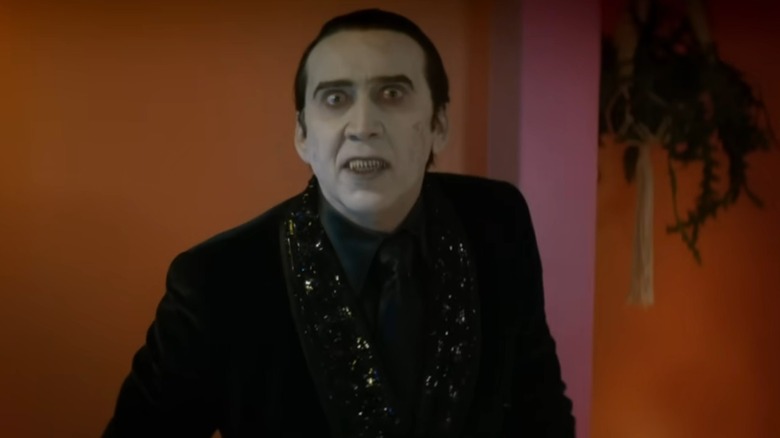Renfield Is Too Bloodthirsty To Sink Its Teeth Into Abusive Relationships
From its first trailer, "Renfield" has promised a unique perspective on an old tale. In taking the titular character from Bram Stoker's "Dracula" and putting him in the modern day, the film is able to examine his relationship with his servant through a contemporary lens. The engaging conclusion it comes to is that Renfield (Nicholas Hoult) is the victim of a narcissistic abuser, making his journey a tragically relatable one of personal liberation.
While "Renfield" is certainly at its best when it wades into this territory — and does so with admirable respect — it never gets past the surface level. Characters make statements about abusive relationships (his group therapy sessions are both amusing and clever ways to quickly dig into this theme) but seldom act on them in a way that shapes the plot.
Unfortunately, the dark comedy of Renfield finding his courage to leave Dracula (Nicolas Cage) is bogged down by a convoluted organized crime plot that seems to exist only to facilitate gory (and admittedly impressive) action sequences. Renfield's defeat of his enemy feels purely physical rather than emotional or psychological. With less plot (and less action) on its plate, "Renfield" might have had room to resolve its conflict without an obligatory punch-up.
The film's gluttony also extends beyond wanton violence. As bodies pile up around the hero, so do thematic ideas that — while intriguing — never interact in a clear enough way to support each other.
Renfield struggles to bring its many ideas together
The biggest barrier standing between "Renfield" and a meaningful message about abusive relationships is its lack of focus — or perhaps more charitably, a lack of cohesion among its many potentially interesting thematic ideas. While trying to tackle the story of one man's liberation from his narcissistic abuser, "Renfield" also takes on themes of redemption and justice in equal — but separate — measure.
These ideas could theoretically exist in support of one another. In fact, tying these threads into one clear thematic line could have made for an interesting exploration of what justice looks like in an abusive relationship or how a victim might feel inescapable guilt for the actions they had to take in order to survive an abusive relationship.
While it's likely these ideas were at least on the writers' minds, they don't show up in the final product. Instead, liberation, justice, and redemption float disparately, resolved independently of one another in dramatic but relatively shallow ways. With more focus, "Renfield" could've used these secondary ideas efficiently without getting lost in them so much that they distract from the core of the narrative.

